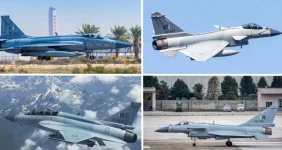- Views: 1K
- Replies: 5
New images have surfaced confirming the near-completion of Pakistan's first dedicated spy ship, the PNS Rizwan. Initially revealed by open-source intelligence expert Damien Symon, the vessel, built by the People's Liberation Army Navy (PLAN), signifies a considerable leap in Pakistan's naval intelligence capabilities.
The PNS Rizwan, originally designated as an offshore supply ship, measures 87.2 meters in length and boasts a beam of 19 meters. Its most distinctive features are three prominent domes, believed to house sophisticated tracking equipment and radars. These suggest that the PNS Rizwan is designed for extensive surveillance and intelligence-gathering missions, a critical aspect of modern naval warfare.
The addition of the PNS Rizwan to the Pakistan Navy is widely seen as a direct response to India's INS Dhruv, commissioned in 2021. INS Dhruv has been a vital asset for India, providing the capability to monitor satellite and ballistic nuclear missile activities, not only for its own defence but also for broader strategic interests.
The PNS Rizwan's anticipated capabilities include:
- Telemetry and Data Collection: Similar to INS Dhruv, it likely possesses the equipment to track missile launches and gather telemetry data, crucial for analyzing missile performance and assessing enemy capabilities.
- Electronic Warfare: The radar domes suggest capabilities in electronic intelligence (ELINT) and signals intelligence (SIGINT), enabling Pakistan to intercept and analyze foreign communications and electronic signals.
- Strategic Deterrence: By enhancing its surveillance capabilities, Pakistan aims to strengthen its strategic deterrence, particularly in the Indian Ocean Region, where tensions with India remain high.
While the exact operational specifications of the PNS Rizwan remain classified, its induction clearly signals Pakistan's intent to modernize its navy with a focus on regional power dynamics. This development reflects a broader trend of nations investing heavily in intelligence-gathering vessels to gain strategic advantages.
India, having already integrated INS Dhruv into its naval operations, is expected to closely monitor the activities of PNS Rizwan. The strategic rivalry between India and Pakistan means that any advancement in one country's naval capabilities inevitably triggers a reassessment of defence strategies by the other.

